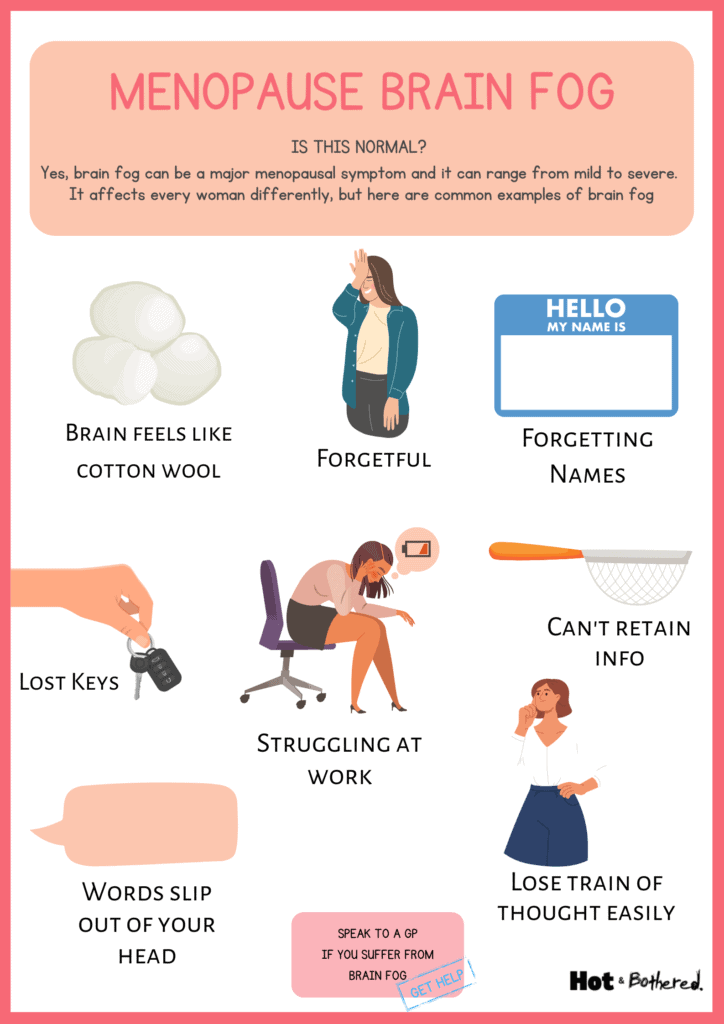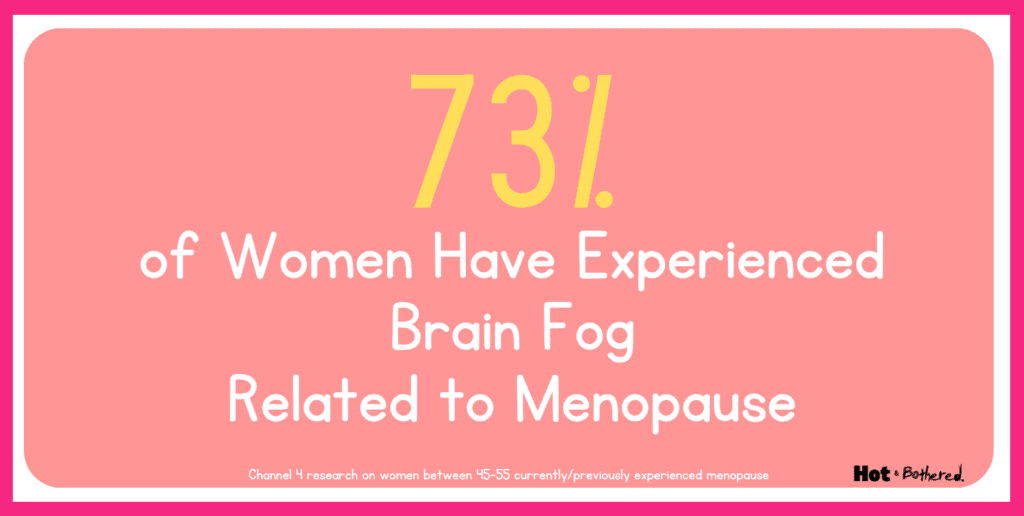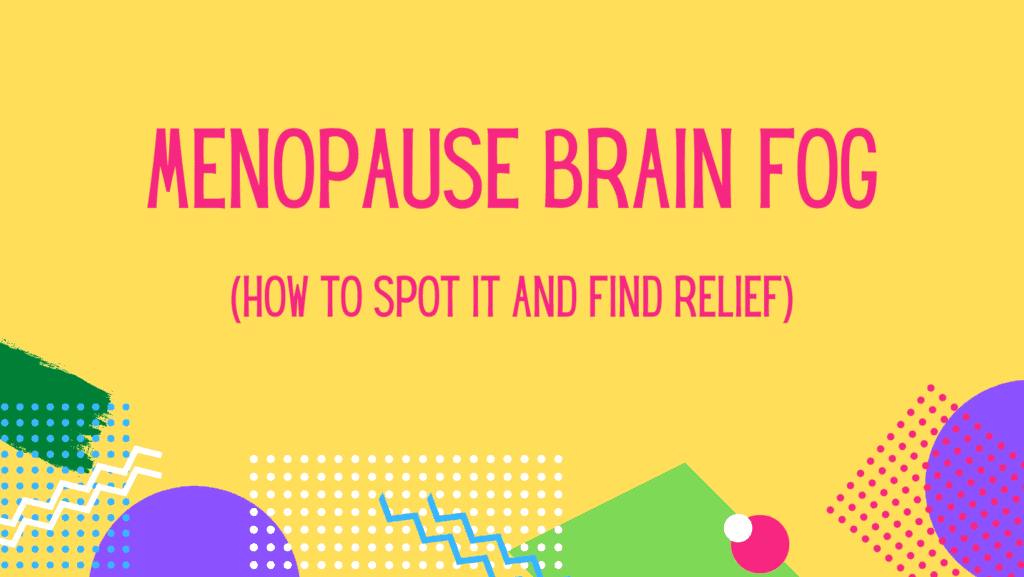Table of Contents
Menopause Brain Fog
What a huge pain in the backside menopause brain fog is. I am not going to sugarcoat this one ladies, it’s a b**ch. The feeling that you might be going insane, being too afraid to tell anyone how you feel, and looking like a complete tool in front of your client when you have forgotten his name, is the worst!
Of all the perimenopause symptoms I have had, brain fog is the one that sneaked up on me the most. Like a very slow, but ominous feeling that something just isn’t right.
What is menopause brain fog?
Menopause brain fog is a very common menopausal symptom, it occurs when our body becomes deprived of its key hormones. Without these hormones, our brain cannot function properly, it cannot create new cells or get the existing ones to form new connections. This lack of oestrogen and testosterone means that our brain is going to struggle to stay focused and keep a tip-top memory.
What are the symptoms of brain fog?
Well, this is a tough one to give exact answers on but let me tell you what I recognise as brain fog symptoms:
- My brain feels like cotton wool
- Forgetful
- Can’t remember the names of anyone
- Easily lose your keys or misplace your phone
- Can’t retrain information
- Struggle to concentrate at work
- Nothing seems to be functioning normally in your brain
- Lose your train of thought easily
- Words seem to just slip right out of your head mid-sentence

It’s really hard to sum this one up but it’s a mash-up of all of the above, a lovely toxic mix of it all and when you lob on anxiety and stress (because these symptoms make you stresses) then cortisol joins the party and it all just gets worse.
I appreciate this sounds dramatic and of course, it isn’t but being supported forgetful can have pretty crap consequences!
It might be helpful if I share with you what my typical day was like before I started HRT and before anyone would listen to me that something was wrong.
In the Morning
I would wake up exhausted from my inability to sleep, plod downstairs, make a cup of tea and sit on the sofa waiting for my head to wake up. I would then forget to set a timer to remind me to wake the kids up, I would realise a little 15 minutes too late and sprint upstairs, wake up the kids (in a very grouchy way, even though it was my fault) speedily iron their uniforms and head back down to make breakfast, of course, I forgot that I was out of milk and bread so I run to the local shop, get back feed the kids and get them dressed before my youngest announcing “you have forgotten today is Space Day at school! I need to go in a space outfit” I head to the kitchen and stand there for a little while desperately trying to remember what was the next thing I had to do…………FOIL! Wrap the youngest in foil and get them to school on time.
At Work
At work, I feel off and put it down to a mental morning. I feel like I am looking at the screen but nothing is going in. I have read this email 4 times! Have a call with a colleague about an important client, and make notes but have not come up with any solution for the issue she has presented me with. I tell her I need a coffee and will take a look shortly.
I try and get on with the day and write my to-do list which seems unachievable and overwhelming. I stare at the screen some more and can’t understand how three hours have passed by. My colleague calls me again and asks how I am getting on with the customer issue…what customer issue? I have completely forgotten the entire conversation and what scares me the most is that even when she tells me what we spoke about, I cannot remember a thing.
In the evening
I get home feeling crap, my head feels fuzzy and I just want to curl up and sleep. The thought of having to think about what to cook for tea seems like a mountain I am not too enthralled to climb, so I order takeout for us all. I slump on the sofa and stare at the TV, completely unengaged with those on the sofa with me.
My kids tell me all about their days, I forgot it was a spelling test today and only remember when my son tells me his score. It is all just a bit too much. Am I going insane, is this dementia? I could cry.
Being diagnosed as perimenopausal came as a massive relief, even if I am early forties. The realisation that this happens to a lot of people meant that I could avoid the giant butterfly nets for a little bit longer.
Who experiences menopause brain fog?

This stat was taken from a channel for documentary and it is fair to say that is a lot of women. Yet we are still expected to act like we are not menopausal!
God forbid we should shed our layers when a raging heat takes over us, or have to record meetings to make sure we don’t forget anything, for menfolk would not do this. We must therefore keep quiet. My arse.
Brain fog can come at any stage in the menopause timeline so this is not reserved for full-blown menopause or early perimenopause. This little sucker can come and go as it pleases.
It sucks having menopause brain fog but let’s not forget that there are things we can do!
How can I treat menopause brain fog?
For me the only thing that truly called time on my brain fog was HRT. I am no doctor but Hormone Replacement Therapy allowed my body to regain its vital hormones which had gone AWOL for years!
If you don’t know about HRT or just want to chat about it, please do contact your GP, you might find that a lot of the information we learned at school, or that we grew up with is wrong and oh-so outdated. There is also some hand help here.
If you are in the early stages of trying to get diagnosed because you are in your forties and no one will take you seriously, then here are a few things you can do to help:
Diet
Bleurgh! Sod off!!!! I feel awful, I have been told off for forgetting stuff at work, I have horrendous Mum guilt, I think there is a chance I may be mental, so you can shove your celery up your…..
I get it.
The last thing I wanted to do was look at my diet when I felt awful but the thing is, deep down, we know it helps.
If we eat a brain-friendly diet we are in with a much better chance of reducing the effects of brain fog, it is that simple. You won’t need to go 100% on this but you can make small increases in Omega 3 by eating some eggs, fish and nuts (not at the same time, bork) This will do wonders in helping our brain cells communicate with each other (according to science buffs)
I am not going to list all the brain-healthy foods and how they help, but take a look at this very smart article, it does a much greater job than me.
https://www.healthline.com/nutrition/11-brain-foods
Exercise
I have to be honest here, when I felt at my worst, the last thing on this earth I wanted to do was work out. No, thank you. But then I knew that if I didn’t do something, I was going to feel worse and that would make me stress, which would make my brain fog worse. So I decided to pick something I might like and that there might be a slim chance that I would like it.
Kettlebells.
Yep, I decided on kettlebells. There was no chance I was running, I was not going to a gym where everyone could see how red in the face I went and I knew that I could do this from the safety of my living room. I picked up a small-weight kettlebell online and got it delivered. I will not lie to you, it sat there for a long time. I looked at it a lot, I moved it next to the TV so I would see it and hopefully use it, yet there it stayed for a few weeks.
The day I decided to use it, I had been scrolling through Instagram and watching a video about how this 80year old woman called Joan, who had arthritis and was overweight, turned her whole life around and was now fit and lean. Well, if Joan can do it, so can I!
I started very slowly and worked my way up. I am no Joan, but I am stronger than I was and most importantly, swinging that kettlebell around like a nutter (safely of course) took away a load of stress and tension, which meant I slept better, which meant the brain fog lifted a bit. For this, I will forever be grateful to Joan.
Sleep
It is so common to have sleep issues when you are menopausal and lack of sleep affects everything. Your energy, your focus, your concentration, your motivation and everything in between are hampered by lack of sleep. When we wake up several times a night we don’t achieve deep sleep. I have learned that deep sleep is what we need to rid the toxins in our brain, give it a good old clear out, so that we can start again tomorrow. Not having this deep sleep slapped on top of hormone depletion is a perfect storm for menopausal brain fog.
The best way to try and achieve deep sleep that I have found is exercise, keeping my phone out of the bedroom (it lives on the landing now) I have a nice cool, dark room and I have a night light. Hear me out…this is a lamp which mimics the sunset and sunrise. So I get into bed and set the 30 min timer on the lamp, it goes from a full-on lamp to a very gentle sunset to darkness. This has done wonders for me. Menopause anxiety is made worse by a sudden light out for me, I lay there looking into the black and think about all the things I have forgotten and need to do. This lamp is a slow, calming reduction of light. It works for me. Here is the link to it.
What Now?
If you have been battling brain fog, please go and speak to your GP. It might not be perimenopause, but it is always best to get these things checked.
If you are unsure about if you are entering menopause, take a look at my Perimenopause Symptom Checker. This is a great way to see if brain fog has been paired up nicely with some other symptoms.
For more information on menopause, in a much more medically advanced way, take a look at The British Menopause Society. There is everything you could need on there, it is always a go-to for me.
Home
Disclaimer: I am not a medical professional, herbal or physical therapist, and I am not educated in the menopause space. All opinions expressed on this blog are my own and should not be taken as medical advice. This blog is intended to share my personal experiences and insights, and should not be used as a substitute for professional advice. Please consult a qualified medical professional, herbal or physical therapist for any health-related concerns. Additionally, I strive to keep things light and entertaining, but please keep in mind that the topics discussed on this blog may be sensitive or triggering for some readers.
